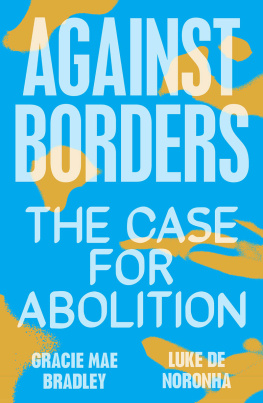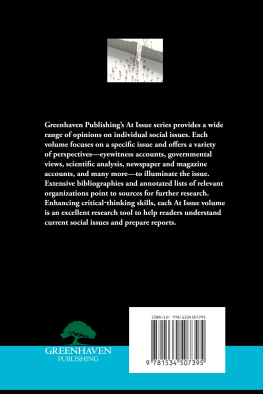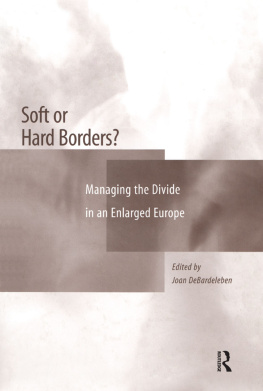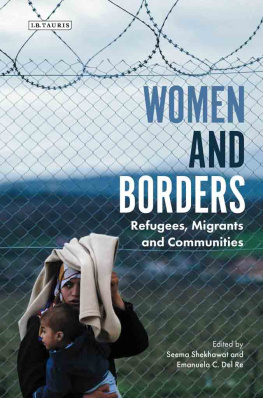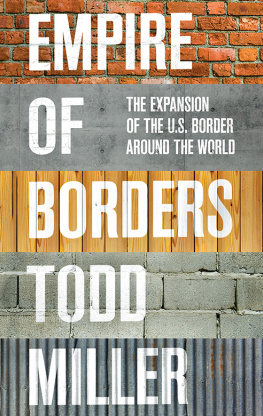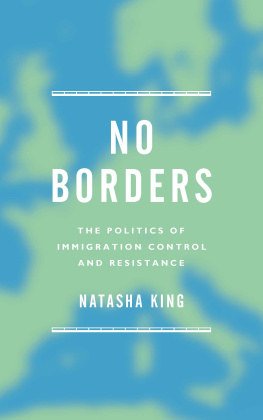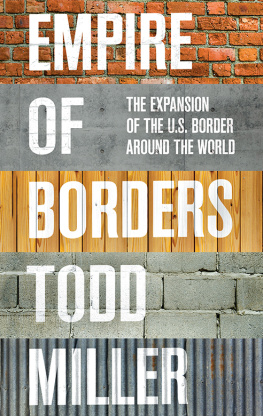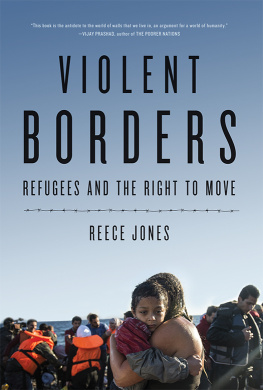Contents

AGAINST BORDERS
AGAINST BORDERS
The Case for Abolition
Gracie Mae Bradley and Luke de Noronha

First published by Verso 2022
Gracie Mae Bradley and Luke de Noronha 2022
All rights reserved
The moral rights of the authors have been asserted
1 3 5 7 9 10 8 6 4 2
Verso
UK: 6 Meard Street, London W1F 0EG
US: 388 Atlantic Avenue, Brooklyn, NY 11217
versobooks.com
Verso is the imprint of New Left Books
ISBN-13: 978-1-83976-195-9
ISBN-13: 978-1-83976-196-6 (UK EBK)
ISBN-13: 978-1-83976-197-3 (US EBK)
British Library Cataloguing in Publication Data
A catalogue record for this book is available from the British Library
Library of Congress Cataloging-in-Publication Data
Names: Bradley, Gracie Mae, author. | De Noronha, Luke, 1990 author.
Title: Against borders : the case for abolition / Gracie Mae Bradley and Luke de Noronha.
Description: London ; New York : Verso, 2022. | Includes bibliographical references.
Identifiers: LCCN 2022005543 (print) | LCCN 2022005544 (ebook) | ISBN 9781788735803 (paperback) | ISBN 9781788735797 (ebk)
Subjects: LCSH: Boundaries. | Citizenship. | Emigration and immigration. | Freedom of movement.
Classification: LCC JC323 .B73 2022 (print) | LCC JC323 (ebook) | DDC 320.1/2 dc23/eng/20220325
LC record available at https://lccn.loc.gov/2022005543
LC ebook record available at https://lccn.loc.gov/2022005544
Typeset in Garamond by Biblichor Ltd, Edinburgh
Printed and bound by CPI Group (UK) Ltd, Croydon CR0 4YY
Contents
Common-Sense Borders
What do borders do? In conventional accounts, borders establish where one country ends and another begins. They are lines on maps, permanent and taken for granted. Borders delineate a countrys territory and mediate the movement of people and goods in and out. They keep out the things that are prohibited: undeclared sums of money, live animals, invasive plant species, disease, drugs and of course, unauthorised people.
For affluent people in the global North, borders can be crossed with relative ease. There is the brief discomfort of luggage scanners and passport control, before the warm embrace of distant family and the languor of holidays. Law-abiding travellers accept the pat-downs and full-body X-ray scans because they believe that they have nothing to hide and, indeed, because they share a desire for control, order and safety.
It is this desire for control and security that defines the politics of immigration more broadly: the headlines and political speeches that rail against the dangers of unchecked migration.
Borders are always being breached, it seems. Hence the watery metaphors the deluge, waves, or floods of migrants surpassed only by the animalising language of swarms. Migrants usually come into focus as an assortment of their most threatening characteristics, and the arrival and settlement of migrants too many, too fast, the wrong type is seen as bringing only risk, insecurity and national decline.
In this context, governments seem continually compelled to allocate greater resources and more sophisticated technologies to strengthening their borders. The recent rise of right-wing governments has been accompanied by the proliferation of border walls, razor-wire fences, floating barriers in the sea, drones surveilling migrants crossing deserts and oceans, push-backs at the borders of Europe, and the processing of asylum claims in offshore detention camps. The intensification of violent and spectacular bordering is intimately connected to the ascendancy of racist, nationalist and right-wing governments in the present historical moment.
But this is not only a problem on the right. Voices from across the political spectrum assert that borders are sensible and necessary. Many political parties and even trade unions argue that borders protect the working classes from low wages caused by a surplus of migrant labour, ease strains on housing and public services, and preserve the way of life and national culture of migrant-receiving societies. Borders are also said to combat people-smuggling and sex-trafficking, and to prevent the most valuable and talented individuals from abandoning poorer countries. Across these accounts, people on the move are reduced to statistics, units of labour, racialised threats, legal categories and abject victims. Their humanity is effaced, and the push factors driving their decisions to migrate hang in the background: a kind of miasma of war, persecution and ecological collapse divorced from the actions and histories of countries in the global North.
Part of the problem is that the global system of nation-states is simply taken for granted, as if countries and the inequalities between them were natural and permanent. Citizenship the political/legal system that assigns individuals to states goes unquestioned. More than this, citizenship is seen as a universal good, a marker of political inclusion and subjectivity, and each individual is supposed to be a citizen at home, where they have deep cultural and social ties, and thus where they belong. In this context, immigration controls are seen as merely enforcing coherent legal and spatial distinctions between national populations, through such bureaucratic devices as visas, passports, border checks, and agreements between states. Borders between nation-states are seen to be vital for democracy: they demarcate the necessarily bounded demos.
To sustain this account of borders, all nation-states must be represented as formally equal and sovereign. But this conceit requires a deep historical amnesia about colonialism, and an unwillingness to consider ongoing relations of economic domination. Of course, not all citizenships are equal; citizens of Sweden, New Zealand or the United States have substantially better life chances and greater freedom of movement than citizens of Bangladesh, the Democratic Republic of Congo or Kyrgyzstan. Immigration controls do not simply carve up the world then, they enforce fixed legal and spatial distinctions between highly unequal nationalised populations.
This book challenges the entire logic of this global order, refusing to accept the world of grossly unequal nation-states. It argues that citizenship and borders, far from protecting democracy and rights, in fact reproduce various forms of inequality, injustice and harm at different scales.
Borders Are Everywhere
The glaring problem with these dominant accounts is that borders are not, in fact, very effective at achieving their stated aims. With or without legal authorisation, the right paperwork, or the right status, people move. Borders may force migrants to take different, longer and more dangerous routes; to use documents in other peoples names; and to pay people to facilitate the journey. By depriving people of safer and more direct routes, borders therefore often expose them to harms robbery, extortion, exploitation and violence but they do not stop them moving.
And so, people arrive. They make friends, fall in love (with people and with places) and sometimes decide to stay. If they do so without regular status, they might then be excluded from rights to work, to rent housing lawfully, and to access essential public services like health and education. In this context, they are compelled to take jobs within particular sectors, often with particularly bad working conditions, sometimes on pain of criminalisation.

